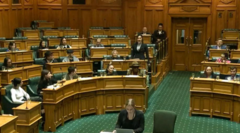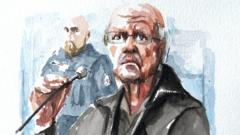The shocking killing of UnitedHealthcare CEO Brian Thompson in New York has unearthed long-simmering grievances against the health insurance industry, as many Americans express their frustrations over high costs, denied claims, and a convoluted system designed more for profit than patient care.
Purge of Fury: The Murder of a Health Insurance Executive Sparks Debate on U.S. Healthcare Crisis

Purge of Fury: The Murder of a Health Insurance Executive Sparks Debate on U.S. Healthcare Crisis
The recent assassination of a high-profile insurance CEO has ignited public outrage against the complexities and profit-driven nature of the U.S. healthcare system.
The brazen killing of Brian Thompson, CEO of UnitedHealthcare, outside a New York hotel has sent shockwaves through the nation, exposing deep-seated anger towards the U.S. healthcare system. This recent act of violence has amplified frustrations regarding a sector often characterized by its profit motives and complex practices.
"Prior authorization" may seem innocuous, yet it was a rallying cry on a sweltering day in July as over 100 demonstrators converged outside UnitedHealthcare's Minnesota headquarters. They protested against denied patient claims and the bureaucratic labyrinth that hinders access to healthcare. Eleven protestors were arrested for obstructing traffic, a testament to the escalating tension surrounding health insurance policies.
The catalyst for this unrest was Thompson's loosening grasp on a debilitating system for many Americans. As the fears and frustrations boiled over, details emerged surrounding Thompson's life, underscoring the intertwining of corporate responsibility and public sentiment. With operations linked to a trillion-dollar industry, his company's practices faced scrutiny from a populace burdened with rising healthcare costs and denied treatments.
Messages discovered on shell casings at the crime scene with words like "deny," "defend," and "depose" have fueled speculation about the motivations behind the shooting. Social media users and critics of the insurance industry expressed mixed feelings, with many citing personal stories of coverage denials. A woman publicly lamented the insurance battle during her stage 4 cancer treatment, encapsulating the anguish many face against corporate insurance giants.
Paulette Thompson revealed to NBC that her husband had received threats prior to the incident, a reality reflecting the fragile intersection of corporate power and public discontent. Philip Klein, a security expert, commented on the escalating tension nationwide, suggesting no organizational leader is immune from the surrounding anger.
Responses from across the political landscape reveal a collective frustration. Statements of sorrow from industry officials stand in stark contrast to online reactions where some seemed to celebrate Thompson's demise as a form of poetic justice against the healthcare system's failings.
Analyses show an intricately broken healthcare setup in America. Sara Collins from The Commonwealth Fund highlighted the overwhelming frustration that manifests when patients struggle to navigate insurance complexities. With nearly half of working-age insured adults facing unexpected charges and denials, the underlying grievances are heightened within a system many perceive as broken.
Recent studies report that 45% of adults faced charges for services they believed were covered. Patients with chronic conditions have found themselves embroiled in devastating financial burdens, with research indicating some have racked up hundreds of thousands in bills due to insurer restrictions.
Amid an ongoing lawsuit against UnitedHealthcare for practices involving AI, numerous calls for reform demand attention. As the nation grapples with the aftermath of Thompson's death, the deeper issue of healthcare's accessibility, complexity, and rising costs stands starkly illuminated, raising urgent questions about the future of health insurance in America.





















